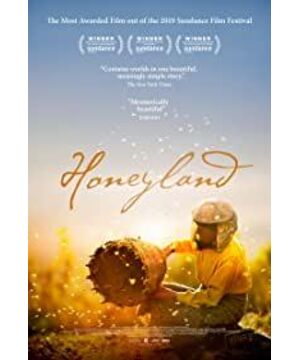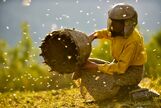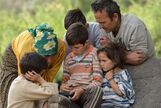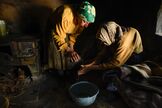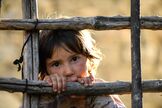A documentary is a film or TV art form that uses real life as the creative material, real people and real things as the object of expression, and artistic processing and display of it, showing the reality as the essence, and using reality to trigger people's thinking. The opening ceremony of the 3rd West Lake International Documentary Conference and the opening documentary show was officially launched at 18:30 on October 18, 2019 in the Gome Auditorium, Nanshan Campus, China Academy of Art.
On the morning of the 18th, I finished watching the well-known Macedonian documentary "The Land of Honey". After Sundance won the award, it was also screened at the Hong Kong Film Festival this year. I met again in Hangzhou. The photographer shared the details of the film with us. . What is very interesting is that this documentary was re-deconstructed because of the intervention of a new family.
Text/East SIR
Official account: put aside the book
The 2019 IDF movie viewing started from "Honeyland". The sweetness of honey and the hardship of the honey maker, the survival wisdom of "take half and leave half", and the greed and desire of the rustling fish are all introverted and moving. However, as a documentary lover, the film and the reverie after the film are not only here. At the beginning of the film, the mother and daughter of beekeeping and later Turkish families obviously jumped in the narrative direction. After the screening, the host quickly grasped this issue and threw it to the photographer who came to the screening. The photographer explained that the first planned film was about environmental protection themes of beekeeping mothers and daughters. Suddenly, a Turkish family came to the scene. This gave a clue to the story of the film. Mother and daughter backgrounds are prepared in advance, and Turkish family backgrounds can only be revealed based on live life scenes. After watching this film, I went to attend Venture Capital. It happened that Director Zhou Hao was doing his own director's interpretation. Director Zhou Hao said: "A good documentary grows." This introduction by the photographer perfectly explained Zhou Hao. The director's words.
The Turkish family that grew up during the filming process just enriched the film and thickened the original environmental theme of the film. If the creators forcibly interfered and ignored the temporary Turkish family as planned, the film would be much inferior. The non-intervention of the documentary is also reflected in another story introduced by the photographer. During the shooting, there was a scene of a little girl drowning. The photographer who was the father of two children resisted the urge to rush out to save someone and chose to stand behind the camera. Let's strip away the moral part of this story: the little girl is not serious from drowning, and she was saved immediately...nothing is more important than life. After stripping away this point, the filming experience of not saving people should be regarded as the ultimate manifestation of non-intervention in documentary production.
An interesting question also appeared after the screening. Some viewers praised the film’s photography and said that the picture was as beautiful as an oil painting. The photographer said with embarrassment that he took a beautiful picture like an oil painting, but neither the director nor the producer Satisfied, this is the result of compromise after their quarrel. At this point, I am the director and producer of the team. I don’t know when, the beauty like an oil painting and a landscape film became a lofty praise for a good movie. This is not only for documentaries but also for all movies. Shouldn't the best pictures serve the content of the story and the tone of the film? Director Jia Zhangke criticized "Legend of Autumn" when he was a student of Beijing Film Academy more than 20 years ago. It is hard to imagine how beautiful "Xiao Wu" and "Station Platform" are like oil paintings. The same goes for filming and documenting the lives of the people at the bottom. Through the viewing and screening of this film, and then corresponding to our previous viewing experience, I suddenly felt that the significance of IDF is not only that it provides us with a good documentary, but also allows us to understand what a good documentary is and how to make it. Documentary. The IDF movie watching from "Honeyland" is really beautiful and I am looking forward to it.
"The Land of Bees"
Director: Tamara Kotevska/Ljubomir Stefanov Starring: Hatidze Muratova/Nazife Muratova/Hussein Sam/Ljutvie Sam Genre: Documentary Official Website: https://honeyland.earth Production Country/Region: Macedonia Language: Turkish Release Date: January 2019 -28 (Sundance Film Festival) Duration: 87 minutes Also known as: Poem of the Land of Honey (Hong Kong) / Honey of the Land (Taiwan) / Honeyland IMDb Link: tt8991268
The bright yellow robe adorns the desolation of the rural Macedonia, reflecting the golden color of wild honey on the cliff. Kadice is the last female bee picker on the land of Europe. She lives with her sick and semi-blind mother, lives on wild bees, and adheres to the golden rule of "take half and keep half." A family of nomads suddenly arrived. It was not only the noise of seven children and a group of livestock that broke the peaceful life, but also the greed of frantically digging out honey, and the unscrupulous destruction of the ecological environment. It took three years to contemplate the secluded life of harmonious coexistence between humans and bees, shining on the earth with natural light and faint candles, and the beauty is so beautiful that people are in awe. Won the Grand Prize of the Sundance Film Festival World Documentary Jury.
Post-screening communication
Q: At the beginning of the film, the focus was on portraying the life between the honey-gathering daughter and mother. Later, did the Turkish family intervene deliberately, or did they re-deconstruct the direction of the film after it appeared?
A: The director and I filmed for a year at the beginning. The original intention was to serve as an environmental documentary. Halfway through the filming, the second family (a Turkish family) came to the filming location. This requires us to make adjustments to the filming.
The emergence of a new family brought many difficulties, especially when it was difficult to communicate with the subject at first. At the same time, during the shooting process, we also began to think about the next development direction and content of the film. On the one hand, I hope to retain the main line of environmental documentaries; on the other hand, I hope that the newly involved families can present and integrate into the entire film in a better way.
Due to the lack of preliminary research on the new family, the filming process needs to constantly communicate with the second family, and follow up with many details...In short, we do not want to arrange the plot, hope the plot will grow naturally in communication.
Q: How long did the filming last? How deeply involved is the filming team in the story? Because there are many poses in the film.
A: It lasted 3 years in total, and the number of shooting days was about 100 days. In some specific locations (such as markets, etc.), it will take 3~5 days to shoot alone. As the person standing behind the camera, I still try to focus on the image itself, minimize intervention and reduce the influence of my own emotions. For example, when shooting the Turkish family's arrival, I kept a very close distance with the cow in order to shoot the scene of the cow entering the village; another example, as the father of two children, facing the scene of a little girl drowning, this was unexpected. In the unexpected incident, I chose to restrain myself when I was photographing in the distance.
Q: What was the shooting process of the movie night scene, and what interesting events did you experience during the shooting process?
A: The indoor scenes at night were shot with natural light (candlelight, firewood), mainly by the photographer and director. After shooting the night scene, the filming team chose to live in a tent next to it, which was very interesting; another example, there were many cats and puppies in the local area. One time when they had a meal, the two of them left in order to shoot the movement of the room. When they came back from the shooting, The food has been eaten by cats and dogs.
Q: Some cinematographic pictures have the characteristics of oil painting. Is it related to the director's view of images?
A: I didn't have too many thoughts before shooting. After a month, I processed the materials of 3 years. After post-production, the director and producer hope that the film will have a more natural trace, and the film presented to everyone is the result of continuous negotiation by the crew.
Q: How was the process of shooting a family quarrel in Turkey completed?
A: The photographer himself is the only Turk in the play. He has done a lot of related work, hoping to make the subject forget the existence of the photographer. The content of the final quarrel was very real and did not have a sense of involvement. It was edited from a large amount of material, which belongs to the charm of editing.
Q: After shooting, how to deal with the relationship with the family in the film?
A: We still maintain close contact and helped the protagonist of the bee picker buy a residence in the town; in addition, we also helped the children of the Turkish family apply for a student fund to help them receive a better education.
Short comment
The film captures many delicate behaviors of the heroine, caressing the bee on her hand to let it fly away, using leaves to help the drowning bee escape, and constantly kissing her mother, etc. Behind these delicate behaviors is the hostess’s treatment of the bees to the natural environment. The fraternity, the love for the mother.
At the same time, all the contradictions in life are also presented to us one by one, not only between family and family, but also within the family...
The little boy was dissatisfied with his father’s utilitarianism and harshness. He ran away from home and followed the beekeeper to pick bees. Even though he was finally brought home by his father, he seemed to express the child’s consciousness and cherish the emotions between bees and bee pickers. .
Thinking of the whole family of children in Turkey, the beekeeper confided to her mother the worries of having no children, and the grudge between the mother and daughter died prematurely, leaving only a slightly joking encouragement: "You will find the object", a kind of faint sadness slowly Flowing.
Film photography is also very brilliant, big vision, back-lighting lens assembly, hand-held camera to capture the process of catching cows and so on. Especially after the death of her mother at the end, the beekeeper once again came to the cliff to catch bees. She also gave a backlighting lens, but this time it was no Turkish boy who accompanied her, but the black dog that followed her all the way, sharing The delicacy of the land of honey.
After the screening, the photographer said that the main line of the original film was an environmental documentary, but the emergence of the Turkish family naturally gave rise to more exciting themes, which added emotion and conflict to the film. As the "Complete Handbook of Documentary Film Creation" said: "After watching this series of events full of meaning, emotion and contradictions, reason and emotion have been sublimated."-Leo Qian
A leaf can save a bee, and a neighbor can kill a life. She cried and said to her mother, if you are a baby, I will take you away from here. She told the boy in the neighbor's house that if I had a son, life would be completely different. Being able to make an agreement with the queen bee cannot stop human greed. The mother who guards against eye diseases has experienced too much winter and no longer looks forward to spring. Inseparable from the land of honey, as if this is fate, just accept fate. ——Xilouchen
Post-screening finishing: Leo Qian (student at Zhejiang University)
Photo shoot: Godot
Add the WeChat account paokaishubenxbb to join the national fan group
View more about Honeyland reviews


